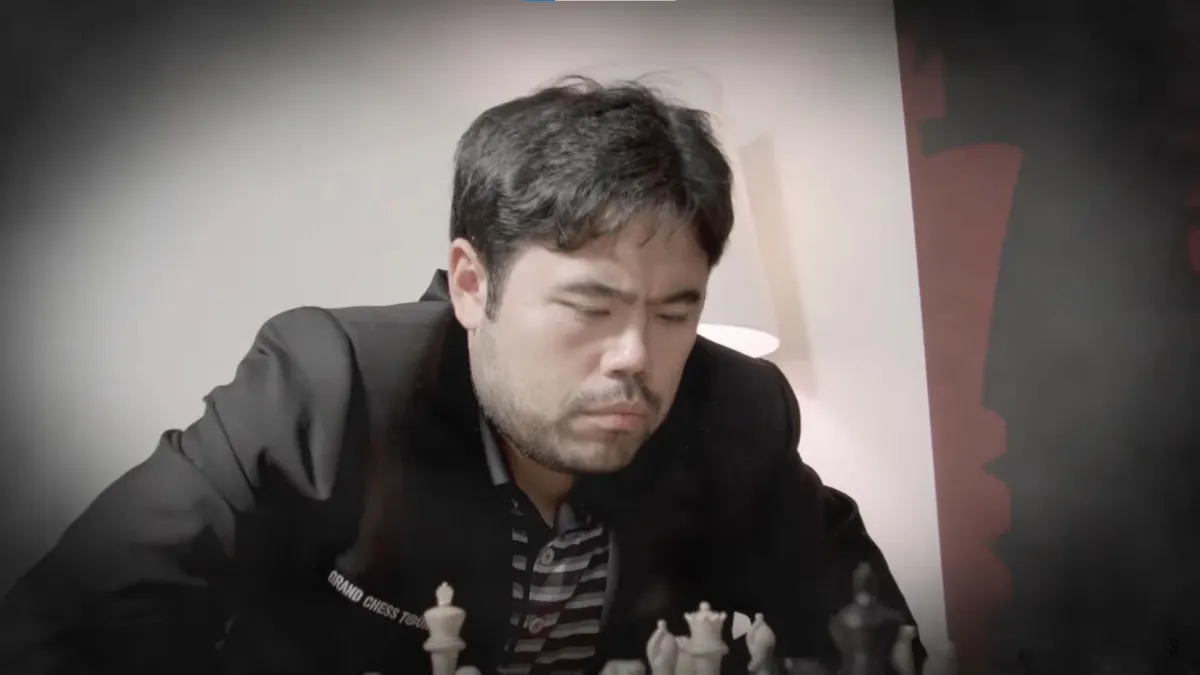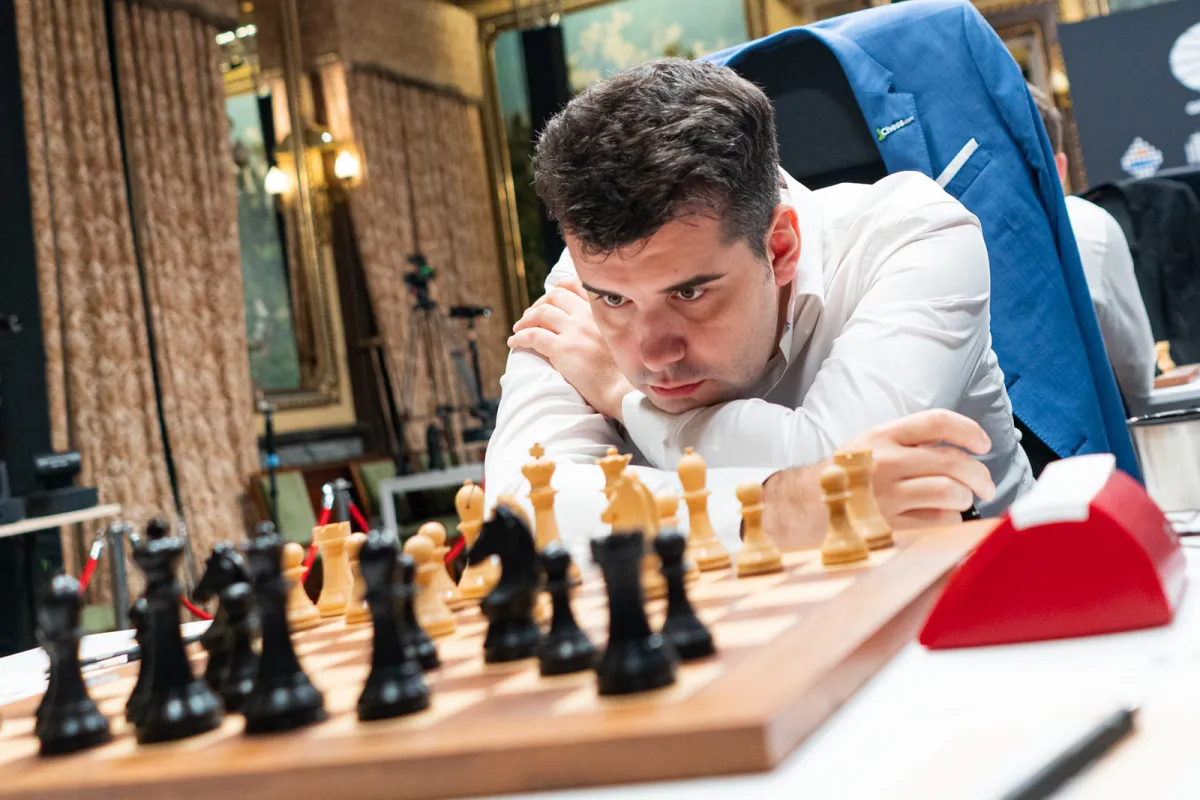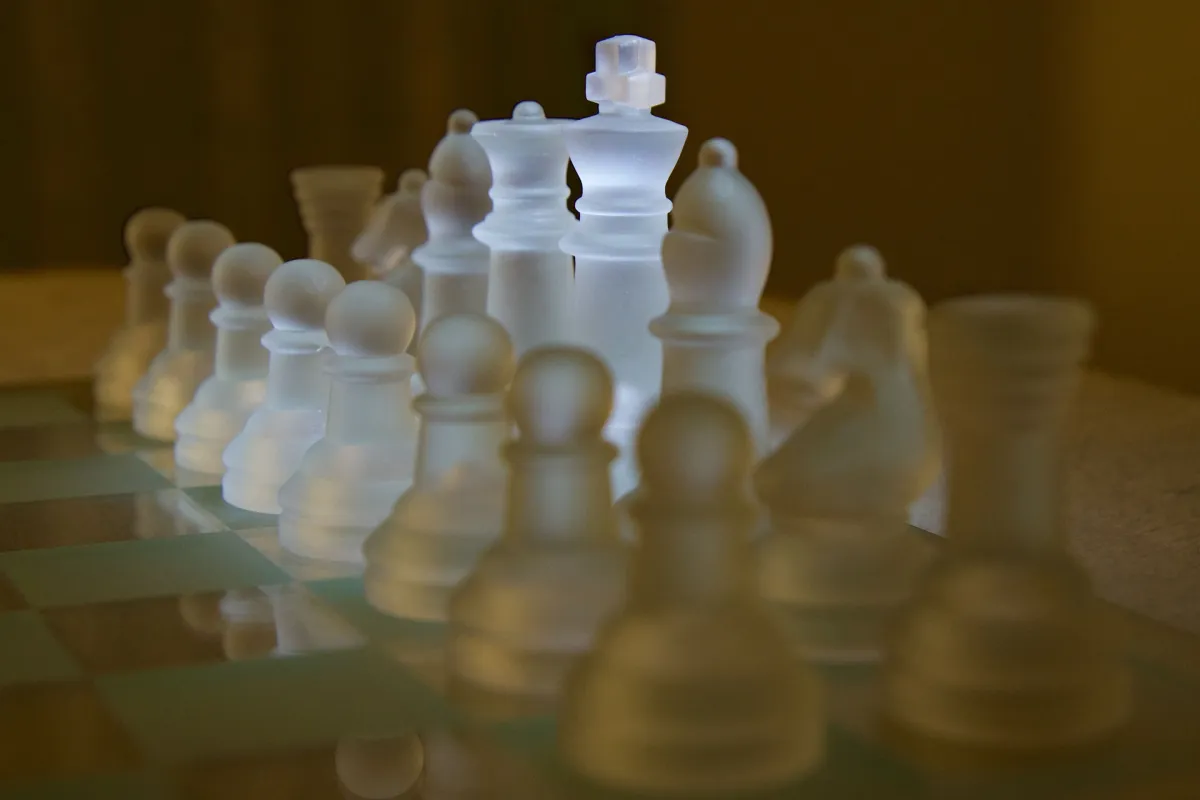Hikaru Nakamura, chess streamer extraordinaire and world No. 6, has long been at the forefront of chess content creation, spearheading the growth of the game on Twitch and beyond in the past couple of years.
We had a chance to chat with him before he began his quest to defend his title at the St. Louis Rapid & Blitz tournament. Our wide-ranging discussion covered the state of chess as a spectacle and a sport, balancing streaming and competitive play, and the future of the game in the digital space.
Nakamura has a unique insight and strong opinions on chess as a form of entertainment and the emerging questions of the sport as FIDE grapples with the issues of our time. He’s also continuing to lead the evolution and adaptation of chess content while maintaining a presence at the highest levels of over-the-board competition.
How do you prepare for a tournament nowadays, with streaming being the main priority? Does your undefeated run at the event last year feel more like an inspiration or a burden?
Nakamura: Nowadays, I refer to myself as a streamer first and as a chess player second, as my priorities have shifted in the past couple of years. When I approach a tournament, my main goal is to play well and everything else after that is what it is. I look to have a good result, that’s really all that I aspire to.
That said, obviously, I’m a competitive player and I’ve played chess my whole life, but I have found that you perform better if you put less pressure on yourself. Last year’s result is almost impossible to repeat, I don’t think it’s realistic to expect that, especially against the current, much stronger field.
How do you balance your streaming obligation and your chess preparation nowadays? You did take some time out to prepare for the Candidates Tournament—did you do so this time as well?
It’s very tricky. Certain OTB competitions are much more important than any other event, but they are few and far between. This tournament is an important one, but the recent Rapid Chess Championship on chess.com also featured multiple players who participate in St. Louis as well. Generally, I don’t take a lot of time out from streaming nowadays to prepare for an event like this.
The Candidates Tournament is unique since if you win that event, you play in the world championship match, so everyone is preparing for months. Most players probably haven’t done more than a couple weeks of specific preparation for St. Louis. Therefore, it’s a bit more casual and you can sort of play yourself into the tournament.
Does this also apply to an event with classical time controls, like the upcoming Sinquefield Cup?
I would say it’s the same thing—perhaps the one difference is that you can recover from a slight mistake in rapid and blitz games, and sometimes the clock comes into play, and you’re looking to play easier moves rather than trying to find the best ones. Some of the decision-making is different. When you’re doing preparation for classical games, you feel like one mistake can end your game, so you’re more focused in a way.
What is the most important thing casual fans don’t understand about competitive play?
There’s a 1,000-point rating gap between a strong amateur player and myself. At the same time, the distance between a player like me or Magnus and Stockfish is also about 1,000 points. There’s almost no way to put that into perspective. When fans look at the bar and go “how are the best players in the world missing all these easy wins?” or “so-and-so is winning the position,” it is often not clear at all to us.
In the last Titled Tuesday event, everyone was saying “Magnus is losing” in my chat at one point. I looked at it and found that the position was very complicated, maybe with one or two moves for the opponent to maintain their advantage. Low time, complicated position: it’s easy to confuse what the eval bar says with the reality over the board. And Magnus ended up winning that game.
Do you think the evaluation bar improves the tournament viewing experience?
Oh, absolutely. I think this used to be one of the biggest issues with chess broadcasts in the past. When people tried to get the game on television, poker was a straightforward comparison, with the math clearly displayed on the screen to make it easier to follow what’s going on. It’s more complicated in chess and you can’t just add up the piece values to understand the position. I think the bar is the best way to display the imbalances and to give casual players an idea of what’s happening on the board.
Can classical chess be made into good broadcast product for the online era?
I think it’s certainly possible to do that, but it would have to be more about personalities. At the end of the day, the biggest issue with classical chess is that there are a lot of draws. It is inevitable because players make fewer mistakes, but people want to see a winner. In most sports, perhaps apart from soccer, draws are rare.
The possibility of games that are pretty boring from start to finish definitely makes it difficult as well. It’s tough. There is a place for classical chess but a lot of that depends on the players and a sort of spirit of play more aggressive and interesting games. In the absolute top events, where everything is based on rankings and players have so much time to strategize, this is rare.
Format changes are constantly discussed in the chess space. The American Cup had a double elimination format, Norway Chess followed classical draws with faster time control deciders. Are any of these appealing to you?
Something between rapid and classical makes the most sense to me, somewhere along the lines of what they did at the American Cup. Chess has really changed. Historically, there’s a reason why people had all this time: 100 to 150 years ago, players had no knowledge of the opening phase and started to think after just two or three moves. Nowadays, top-level players can play the first 10 to 15 moves within a couple of minutes. That means they have too much time for the rest of the game, at which point things have simplified on the board.
Generally, it’s rare to see a lot of blunders. Of course, Magnus is still winning a lot of games, but at the end of the day, I believe there are going to be less and less decisive results because of the advancements in opening theory. Slightly shorter games where players still have enough time to think in certain critical moments could be the way to go.
Perhaps this should apply to the World Championship as well?
It’s going to be very interesting to see what will happen now that Magnus has dropped out of the match. It’s hard to see a world where you have a world champion who hasn’t defeated who’s clearly best player in the world right now. I think changes will be coming, but who knows whether it’s going to turn out to be exactly how Magnus wanted it for this past cycle.
Parties like chess.com and myself are very much about quicker chess and bringing the game to an online audience. FIDE hasn’t done a good job with that and aren’t very aware of this, and I think this is a part of why they’re struggling to bring in big corporate sponsors.
Everyone has a different vision about where chess is going but I’m optimistic. If Magnus is not involved, it will be very tough to maintain interest in any world championship match.
Looking back at the Candidates, how do you feel about your performance as a player and as a content creator?
For me, it was a big success. My one true regret in competitions was my performance at the 2016 Candidates Tournament in Moscow. I put way too much pressure on myself, and I performed really badly: I was never really in contention. This time, even though I didn’t win the event and it wasn’t realistic by the midway point, I thought I performed very well, and I played the tournament on my own terms. Of course, it was a shame that I lost in the last round and missed out on second place, but I’ve proved to myself that had a couple of things broke my way, I could have played in a world championship match.
As a content creator, I did not expect so many people to watch my recaps. Not just from the chess world, but also relatives I know who had no interest in chess also found them. I think there’s potentially a model where players can bring games to the public in this form and could add a lot to the game.
That said, since I’ve moved more into the content creator space, I tend to be much more open in what I talk about in my recaps. A lot of chess players keep their cards close to the chest and may even outright lie about their preparation, bluffing about which lines they looked at in post-game interviews.
In some ways, this would be similar to how esports teams edit and broadcast their comms as a game. What are your thoughts on the “chess as an esport” discussion? Do you think the comparison is appropriate, or is it just semantics?
I think the notion of online chess as an esport is here to stay, we’ve already proven that with the Meltwater Chess Tour and chess.com’s events. The idea of LAN events in an arena, like the RLCS, is kind of questionable to me when you can just simply pull out a wooden chessboard and play the game without an internet connection.
What do you think is the average ELO of your viewers? Has this changed how you approach breaking down the games over the years?
A core value of mine is to never dumb down my analysis of the game. Having done this since 2019, I figured out how to make it exciting but without giving up my ability to play at this level. I think there are a fair amount of semi-serious amateurs, somewhere between the 1000-1500 ELO levels, who maybe played two or three tournaments but not much more than that.
There are also world-class players who tune in, and also some who don’t play the game themselves at all. I think this is because I don’t solely talk about the games, but I also share stories about the players and personalities, my travels, and other topics.
Tournament lineups are still affected by COVIDand visa issues. In your opinion, will the past two years’ of chess results be viewed with an asterisk in the future?
A lot of the chess purists keep saying how different online chess is from the over-the-board experience. There’s one problem with this: the winner of the Meltwater Champions Chess Tour was Magnus. Recently, at the Rapid Chess Championship, I lost the final match to Ian Nepomniachtchi. He won the Candidates Tournament. You’re still seeing the same players at the top.
I don’t think there’s going to be an asterisk: the one thing that we’re seeing a lot of is the massive rating gains of the junior players who have been unable to play OTB tournaments in the past two years, and this is also due to the studies and the online games they were able to play during that time.
What’s next for chess (and chess content)? Is the “pandemic boom” fully behind us?
First of all, I’d differentiate between two booms. First, when the lockdowns happened and I was collaborating with xQc and many other big content creators: looking back at it, it was very big on Twitch and it was a huge boost to my channel, but it was exclusive to the platform. Then, at the end of the year, The Queen’s Gambit came out, and it brought a huge influx of followers who would never have been involved with chess otherwise.
Yes, that particular boom from the series has definitely died down. Back in early 2021, I was getting around 30 000 viewers no matter what I did. Those days are gone, but for me, the Twitch boom felt like the OG boom. Looking at the stats now, my concurrent viewer counts are not that far off from where they used to be in 2020. I don’t actually feel like the boom is necessarily over: I think there are going to be periods where the numbers will continue to spike up and the floor is significantly higher than it was before the pandemic. I don’t agree with the notion that online chess is dying—there are always going to be big events that will bring a lot of interest to the game, and it is doing quite well overall.







Published: Aug 29, 2022 03:06 pm